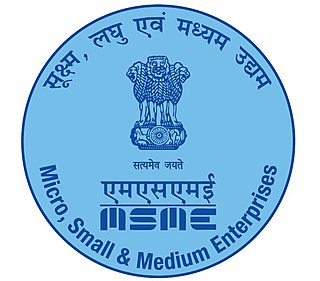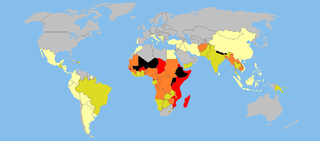
An informal economy is the part of any economy that is neither taxed nor monitored by any form of government. Although the informal sector makes up a significant portion of the economies in developing countries, it is sometimes stigmatized as troublesome and unmanageable. However, the informal sector provides critical economic opportunities for the poor and has been expanding rapidly since the 1960s. Integrating the informal economy into the formal sector is an important policy challenge.
The Licence Raj or Permit Raj is a pejorative for the system of strict government control and regulation of the Indian economy that was in place from the 1950s to the early 1990s. Under this system, businesses in India were required to obtain licenses from the government in order to operate, and these licenses were often difficult to obtain.
Ruth Manorama is a Dalit social activist from Bangalore, India who fights for Dalit women's rights, the rights of domestic workers and those in the unorganized labour sector, as well as urban slum dwellers. In 2006, she was awarded the Right Livelihood Award.
The Commission on Legal Empowerment of the Poor was an independent international commission, hosted by the United Nations Development Programme (UNDP), and established in 2005 as the “first global initiative to focus on the link between exclusion, poverty, and the law.” Drawing on three years of research and consultations, the Commission proposed strategies for creating inclusive development initiatives that would empower those living in poverty through increased protections and rights.

Arjun Kumar Sengupta was an Indian economist. He served as a Member of the Parliament of India, representing West Bengal in the Rajya Sabha from 2006 until his death. In addition to being a Parliamentarian, he was one of India's most noted economists, and led a multifaceted career as an academician and economic policy administrator.
The economic development in India followed socialist-inspired politicians for most of its independent history, including state-ownership of many sectors; India's per capita income increased at only around 1% annualised rate in the three decades after its independence. Since the mid-1980s, India has slowly opened up its markets through economic liberalisation. After more fundamental reforms since 1991 and their renewal in the 2000s, India has progressed towards a free market economy. The Indian economy is still performing well, with foreign investment and looser regulations driving significant growth in the country.
Labour in India refers to employment in the economy of India. In 2020, there were around 476.67 million workers in India, the second largest after China. Out of which, agriculture industry consist of 41.19%, industry sector consist of 26.18% and service sector consist 32.33% of total labour force. Of these over 94 percent work in unincorporated, unorganised enterprises ranging from pushcart vendors to home-based diamond and gem polishing operations. The organised sector includes workers employed by the government, state-owned enterprises and private sector enterprises. In 2008, the organised sector employed 27.5 million workers, of which 17.3 million worked for government or government owned entities. The Human Rights Measurement Initiative finds that India is only doing 43.9% of what should be possible at its level of income for the right to work. Employees are routinely taken advantage of by their employers because of loose labour laws across all industries in India.

Retailing in India is one of the pillars of its economy and accounts for about 10 percent of its GDP. The Indian retail market is estimated to be worth $1.3 trillion as of 2022. India is one of the fastest growing retail markets in the world, with 1.4 billion people.

The Ministry of Micro, Small and Medium Enterprises is the ministry in the Government of India. It is the apex executive body for the formulation and administration of rules, regulations and laws relating to micro, small and medium enterprises in India. The Minister of Micro, Small and Medium Enterprises is Narayan Rane.

A significant proportion of children in India are engaged in child labour. In 2011, the national census of India found that the total number of child labourers, aged [5–14], to be at 10.12 million, out of the total of 259.64 million children in that age group. The child labour problem is not unique to India; worldwide, about 217 million children work, many full-time.

Mirai Chatterjee is a leader of the Self-Employed Women's Association, SEWA (India). She joined SEWA in 1984 and was its General Secretary after its Founder, Ela Bhatt.
The Confederation of Free Trade Unions of India is a trade union confederation in India. N. Kanaka Rao is the general secretary of CFTUI. CFTUI became a full member of the World Confederation of Labour in 1999. In 2003 the then CFTUI president Ashok Kumar Trivedi was assassinated.
Renana Jhabvala is an Indian social worker based in Ahmedabad, India, who has been active for decades in organising women into organisations and trade unions in India, and has been extensively involved in policy issues relating to poor women and the informal economy. She is best known for her long association with the Self-Employed Women's Association (SEWA), India, and for her writings on issues of women in the informal economy.

Martha Chen is an American academic, scholar and social worker, who is presently a lecturer in public policy at the Harvard Kennedy School and senior advisor of the global research-policy-action network WIEGO and a member of the Advisory Board of the United Nations University World Institute for Development Economics Research (UNU-WIDER). Martha is a development practitioner and scholar who has worked with the working poor in India, South Asia, and around the world. Her areas of specialization are employment, poverty alleviation, informal economy, and gender. She lived in Bangladesh working with BRAC, one of the world's largest non-governmental organizations, and in India, as field representative of Oxfam America for India and Bangladesh for 15 years.
The National Centre for Labour or NCL formally came into being in May 1995 in Bangalore, Karnataka State, India. The creation of NCL as a national confederation of Labour organisation in the unorganised / Informal sector of India was the outcome of a study of informal sector organisations that concluded that the absence of a collective voice for the informal sector workers / labour at the national level resulted in their concerns not being effectively addressed at the national level. NCL was constituted by its founding organisations namely National Federation of Construction Labour (NFCL), Self Employed Women’s Association (SEWA), National Fish Workers Forum (NFF), Sarva Shramik Sangh, Van Mazdoor Mandal, Kamani Employees Union and other independent trade unions.
The term unorganised sector when used in the Indian contexts defined by the National Commission for Enterprises in the Unorganised Sector, in their Report on Conditions of Work and Promotion of Livelihoods in the Unorganised Sector as "... consisting of all unincorporated private enterprises owned by individuals or households engaged in the sale or production of goods and services operated on a proprietary or partnership basis and with less than ten total workers."

Atal Pension Yojana, formerly known as Swavalamban Yojana is a government-backed pension scheme in India, primarily targeted at the unorganised sector. It was mentioned in the year 2015 Budget speech by the Finance Minister Arun Jaitley. It was launched by Prime Minister Narendra Modi on 9 May 2015 in Kolkata.
Unorganised Workers' Identification Number or UWIN is a proposed unique number to be issued as identity proof to unorganised workers in India.
Pradhan Mantri Shram Yogi Maandhan is a social welfare scheme launched by the Ministry of Labour and Employment of the Government of India in February 2019 for poor labourers in the unorganised sector from minimum 18 years of age to maximum 40 years.
Pankaj Chandra is an Indian educationist, author and academic. He was Director of the Indian Institute of Management, Bangalore, from 2007 to 2013 and since 2014 has been the Vice Chancellor and Chairman of the Board of Management of Ahmedabad University in Ahmedabad.







